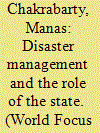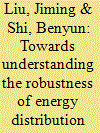| Srl | Item |
| 1 |
ID:
145380


|
|
|
|
|
| Summary/Abstract |
Natural disasters hit at all in the society without any discrimination, rich and poor. But in reality, it is the poor who are the worst sufferers. One of the most important tasks before us is to introduce a culture of prevention in disaster managers and all communities at all levels. The culture must be disseminated so that all people in the society can become alert and become aware so that they can take some preventive measures in case of an emergency or before the disaster strikes. In this regard, early warning and conscious developmental planning are key elements to preventive planning regarding disaster. In India, now we experience a paradigm shift from post disaster response mechanism to pre disaster prevention, preparedness and mitigation strategy.
|
|
|
|
|
|
|
|
|
|
|
|
|
|
|
|
| 2 |
ID:
126345


|
|
|
|
|
| Publication |
2013.
|
| Summary/Abstract |
A persistent challenge for minority candidates is mitigating negative effects attributed to their unpopular group identity. This was precisely the case for Mitt Romney, a Mormon, as he sought and captured the 2012 Republican presidential nomination. We draw on existing public opinion data about the tepid reaction to Romney's Mormonism from within Republican ranks. Then, we review our own experimental data to examine a potential mitigation strategy, "God Talk," and its emotional costs to the GOP. We find that Romney and similar candidates may avoid direct penalty by party rank-and-file for their minority attributes when using God Talk, but the associated affective response supporters direct at their party may carry yet-unknown putative costs for both party and candidate.
|
|
|
|
|
|
|
|
|
|
|
|
|
|
|
|
| 3 |
ID:
115658


|
|
|
|
|
| Publication |
2012.
|
| Summary/Abstract |
Supply disruptions on one node of a distribution network may spread to other nodes, and potentially bring various social and economic impacts. To understand the performance of a distribution network in the face of supply disruptions, it would be helpful for policy makers to quantitatively evaluate the robustness of the network, i.e., its ability of maintaining a supply-demand balance on individual nodes. In this paper, we first define a notion of network entropy to macroscopically characterize distribution robustness with respect to the dynamics of energy flows. Further, we look into how microscopic evaluation based on a failure spreading model helps us determine the extent to which disruptions on one node may affect the others. We take the natural gas distribution network in the USA as an example to demonstrate the introduced concepts and methods. Specifically, the proposed macroscopic and microscopic evaluations provide us a means of precisely identifying transmission bottlenecks in the U.S. interstate pipeline network, ranking the effects of supply disruptions on individual nodes, and planning geographically advantageous locations for natural gas storage. These findings can offer policy makers, planners, and network managers with further insights into emergency planning as well as possible design improvement.
|
|
|
|
|
|
|
|
|
|
|
|
|
|
|
|